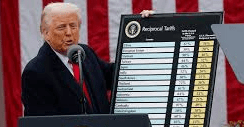By Innocent Samuel Appiah
As the United States government implements a 10% tariff on select imports, including several goods from Ghana, the country faces significant challenges in its export-oriented sectors.
Yet, amidst these hurdles, there lies a formidable opportunity for innovation and collaboration. Industry experts are calling for a united front among stakeholders to not only withstand the impact of these tariffs but also to emerge stronger in a rapidly changing global economy.
The Immediate Impact of U.S. Tariffs
The introduction of tariffs on Ghanaian goods, particularly cocoa, aluminum, and various agricultural products, threatens to undermine the nation’s export competitiveness.
This is a critical moment for Ghana, as its economy continues to recover from the disruptive effects of the COVID-19 pandemic, which already strained supply chains and reduced global demand for its products.
Dr. Nana Baa Wiredu, a renowned International Tourism Consultant, highlights the urgency of the situation. “The tariffs could significantly affect the livelihoods of many Ghanaians, especially smallholder farmers and local businesses that rely heavily on exports,” he stated in a recent discussion. The need for a strategic response is evident, and stakeholders must act swiftly to address both immediate and long-term challenges.
A Collaborative Approach to Strategy Development
To mitigate the adverse effects of the tariffs, Dr. Wiredu advocates for a collaborative approach involving government, private sector players, and civil society. “We need a comprehensive strategy that not only addresses the current tariffs but also positions Ghana for future growth,” he explained.
This strategy should include a thorough examination of the affected industries, identification of new trade opportunities, new trading partners and implementation of support measures for exporters.
One key aspect of this strategy should be the establishment of a task force that includes representatives from various sectors. This task force could facilitate dialogue, share best practices, and coordinate efforts to enhance Ghana’s global competitiveness.
Expanding Trade Relationships within Africa
Dr. Wiredu emphasizes the importance of strengthening trade ties within Africa as a viable solution to the challenges posed by U.S. tariffs. The African Continental Free Trade Area (AfCFTA) presents a unique opportunity for Ghana to diversify its export markets and tap into the growing demand for African products.
“The AfCFTA is not just a trade agreement; it’s a framework for economic integration and collaboration,” he noted. By actively engaging with regional partners, Ghana can reduce its reliance on traditional markets like the U.S. and explore new avenues for growth. The potential for intra-African trade is vast, and Ghanaian businesses must be prepared to seize these opportunities.
Enhancing the Competitiveness of Exports
In addition to expanding trade relationships, enhancing the competitiveness of Ghanaian exports is essential. Dr. Wiredu suggests that this can be achieved through investments in production efficiency, quality improvement, and value addition.
“We need to support local enterprises in modernizing their operations and adopting innovative technologies,” he urged.
Government incentive programmes could play a crucial role in encouraging businesses to invest in their capabilities. By focusing on quality and uniqueness, Ghana can position its exports favorably in the global market, even in the face of tariff barriers.
Attracting Foreign Direct Investment
Another avenue for growth lies in attracting foreign direct investment (FDI). Dr. Wiredu points out that Ghana’s political stability, developed infrastructure, and skilled workforce make it an attractive destination for multinational companies.
“As global supply chains shift, Ghana has the potential to become a hub for investment, particularly in sectors less impacted by U.S. tariffs,” he stated.
Positioning Ghana as a prime investment destination can lead to job creation and technology transfer, contributing to the diversification of the economy. By actively promoting its advantages, Ghana can draw the attention of investors looking for opportunities in the African market.
Prioritizing Tourism as a Growth Sector
Dr. Wiredu also underscores the vital role of tourism in Ghana’s economic recovery. With its rich cultural heritage and natural attractions, the tourism sector has the potential to generate significant foreign exchange and create employment opportunities. “Investing in tourism infrastructure and promoting our unique cultural assets will be key to attracting international visitors,” he noted.
A comprehensive national tourism strategy can help Ghana capitalize on its strengths and establish itself as a premier destination in Africa. By enhancing visitor experiences and showcasing its diverse offerings, Ghana can create a resilient tourism sector that contributes to economic stability.
Fostering a Culture of Innovation
In this period of uncertainty, fostering a culture of innovation is paramount. Dr. Wiredu believes that embracing new ideas and technologies can enable Ghana to adapt to challenges and seize opportunities. “Innovation should be at the heart of our economic strategy,” he emphasized.
This includes encouraging entrepreneurship and supporting startups that can drive economic growth through creative solutions.
Investment in education and skills development is also crucial to equip the workforce for the demands of a changing economy. By nurturing talent and promoting a culture of continuous learning, Ghana can build a more resilient and innovative economy.
Optimism for the Future
Despite the formidable challenges posed by U.S. tariffs, there is a prevailing sense of optimism among industry experts.
With a coordinated and innovative approach, Ghana can navigate these turbulent waters and emerge stronger. Dr. Wiredu concluded, “The key to our success lies in unity, collaboration, and a commitment to embracing change. By leveraging our strengths and exploring new markets, we can turn this challenge into a stepping stone for sustainable growth.”
As Ghana faces this pivotal moment, the call for innovation, collaboration, and resilience resonates strongly. The nation stands at crossroads now, and the path forward requires a collective effort to build a more competitive and diverse economy that can thrive in the face of adversity.










